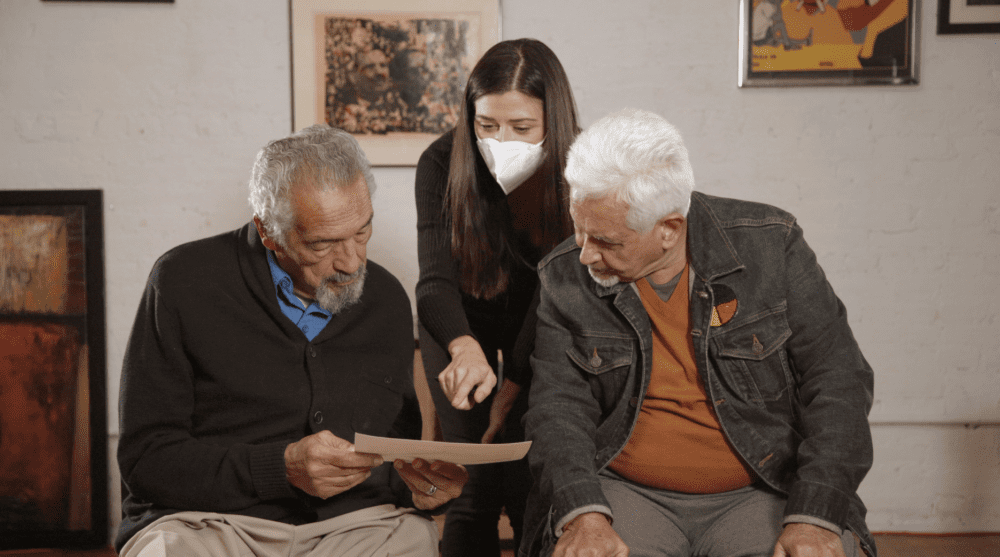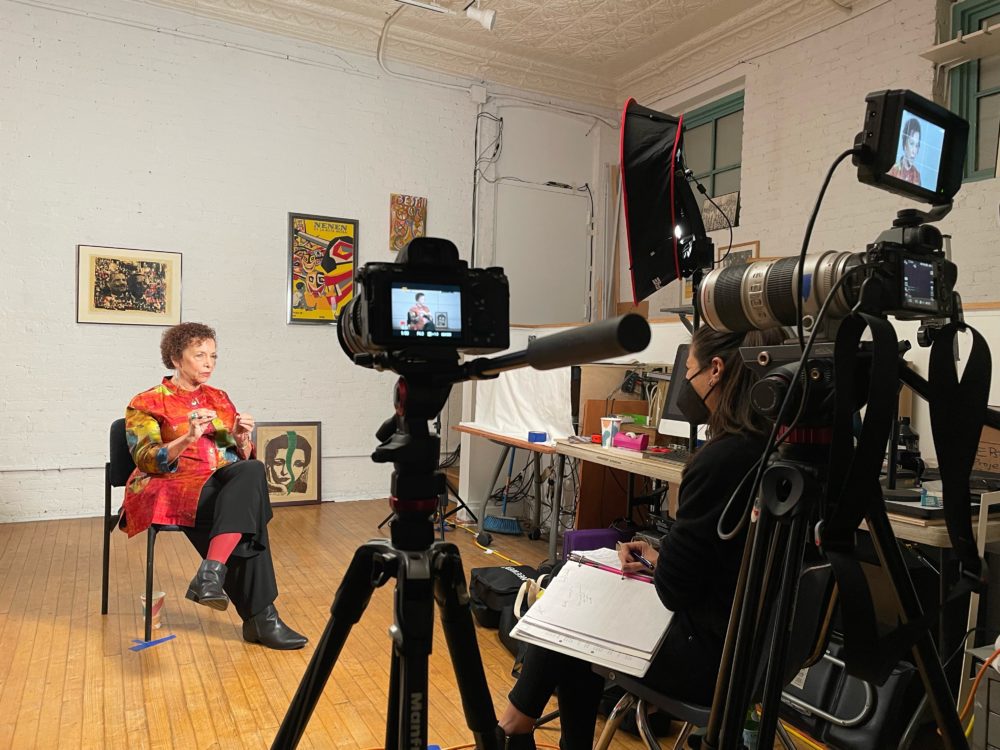We Are The Gotham: Christina DiPasquale, First-Time Feature Documentary Producer, on Overcoming Media Gatekeepers with ‘Barrio Television’
The idea for Barrio Television, Christina DiPasquale’s first independent documentary feature, stemmed from a question she had held since college — one that only intensified over a decades-worth of political campaigns, media coverage, broken executive promises, and harm caused by radicalized hate and disinformation online: “Have we ever overcome media gatekeepers and, if so, how?”
In her Q&A with The Gotham, DiPasquale reflects on her journey from politics to filmmaking, how The Gotham community, through fiscal sponsorship, workshops, and connections, has provided an ecosystem supportive of her work, her discovery of the Realidades program after 10 years of research, and her experience developing Barrio Television.

Can you share a little bit about your background?
My parents inspired much of the journey I’ve taken to get where I am now. My mom, a Colombian medical assistant, and my dad, a Sicilian painter, worked hard to carve out a place for our family within institutions that weren’t built for us. Witnessing the obstacles they faced made me angry, but they also made me passionate. I wanted to dedicate my career to righting the inequities in these systems and effecting positive change in the communities that mirrored my own.
After graduating with a master’s degree in political science from Villanova University in Pennsylvania, I began working for elected officials in my area to implement more progressive policy and even successfully ran for local office myself. I would spend my free time soaking up a multitude of artistic visions, raiding my local library for old, foreign, and experimental films covering a wide spectrum of languages, cultures, communities, and viewpoints. While I wanted to effect change through policy, during that time I also began to think about the deep impact of media on what we understand about ourselves and our world.
I returned to DC as associate director of communications for the Center for American Progress. Later, I started the first digital rights practice at a progressive media agency in the area, bridging my passion for social justice and film. I was finally able to work on publicity and social impact campaigns for films including Dirty Wars, Unmanned, and The Internet Must Go.
Tell us about some of your past projects. How did they lead you to Barrio Television?
In 2015, the National Hispanic Media Coalition (NHMC) recommended I start my own media company, promising to be my first client. I did and began working with NHMC, Free Press and MediaJustice, and others to share the stories and efforts of media makers and media advocates of color working towards more open, affordable, accountable, and community-driven media.
Through my work with activist Chelsea Manning, I joined the XYChelsea team for their Good Pitch presentation and reunited with a former Center for American Progress colleague to book Robin Wright for interviews about When Elephants Fight.
Excited and inspired, I soon began producing short documentaries, largely focused on community alternatives to incarceration, with the real creative geniuses on my Balestra Media team. I’ve learned a lot from them.
Roughly 10 years of archival research later, I found the story of Realidades, where Puerto Rican activists occupied a public television studio in 1972 and, winning a time slot and budget, taught themselves how to make television and hold it accountable to the community. The creators, Latino media advocates, and emerging media makers much like myself, started the first national Latino and bilingual series in the history of U.S. television. Innovators in their field, they designed Realidades to function as a training ground and organizing tool to give Latinos a platform, whether they wanted to work at a TV network or flourish as independent media makers. For the first time, a dedicated national TV series showcased the Latino community’s successes and the systemic, often racist barriers they overcame.

In 2019, I started my search for the creators of Realidades nearly 50 years after the series had ended. It has been the experience of a lifetime to speak with them and hear their stories, while learning more about archival research, producing, grant writing, and directing.
While in development, I was a finalist for Hot Docs and Doc Society grants and, over the past few months, began production. My goal is to finish production in 2022, complete the edit in 2023, and release this film in 2024. I’ve grown in so many ways since meeting my Realidades family. I often repeat to myself a quote from Audre Lord: “When I dare to be powerful — to use my strength in the service of my vision — it becomes less and less important whether I am afraid.”
Your path from politics and policy to communications, media directing, and then filmmaking is fascinating. What was this transition like from working on media campaigns to your feature-length film?
I felt that there was a need to go beyond writing policy, to connect those solutions to the needs, priorities, and values behind them. In transitioning to a media focus, I wanted to share the real community stories essential to igniting change. When I started my research for my film, it was mostly to help me become a better advocate for Latinos in media — what have others done before me and what can I learn from them to bring to my activism and media-making? It was getting to know the Realidades creators that sucked me into making my first feature film: Understanding that what is important to me is also important to a lot of other people.
Though the Center for American Progress is a think tank, it prioritizes communications: Short pieces, stories, and events. CAP’s approach to change inspired me, as did working with the very smart and committed people there who believed in my abilities.
Each media campaign taught me something valuable about filmmaking. Producing short documentaries with community leaders helped me understand how to visually explain systemic inequality and capture what interviewees want to express. Handling publicity and social impact for feature-length documentaries gave me an understanding of what a film can do in the world and how to make sure it gets in front of the audiences who need to see it. Many incredible archivists gave me tips on navigating manuscripts, footage, and photography. The Gotham’s classes have been a big help on pre-production, fundraising, and meeting fellow indie creatives!
What opportunities at The Gotham have been the most helpful to you?
The Gotham was one of the first communities of independent filmmakers I joined in 2019. I had to learn a lot in a short period of time. I’ve taken so many workshops and classes organized by The Gotham over the years, it’s a huge part of my self-styled film school — story development, pre-interviews, grant writing, producing, legal issues, and distribution. I met some of the bravest, hardest-working, and passionate people in The Gotham’s tight-knit community of media-makers telling meaningful stories. I participated in the 2020 Gotham Week. Many of the connections I made through The Gotham became mentors and still give me invaluable advice about my project. My fiscal sponsor is also The Gotham. It was the first Barrio Television application that received an affirmative response!
From your work thus far on Barrio Television, do you think we’ve overcome the media gatekeepers you mentioned earlier?
We have definitely overcome media gatekeepers in major ways throughout history, even if the stories are less known or documented. I know — I’ve searched through nearly a dozen archives to prove it! Realidades did it through media advocacy and television production for Puerto Ricans and Latinos across the country, and there were so many other Black and brown groups working on this issue in the 70s! One by one, I hope we can start to share more about all of them.
Do you have any advice for fellow creatives or members about making the most of their involvement in The Gotham?
Any independent involved in film at any level or role can and should just show up, share the story you’re dying to tell, be someone else’s cheerleader, observe, or build. I think it’s inspiring to remember that The Gotham doesn’t just exist to support indie films but also provides a more helpful ecosystem for indie filmmakers.
Visit http://www.balestramedia.com/barrio-television for more information on Barrio Television. Follow DiPasquale on Instagram @christina.dipasquale.
This interview was edited for clarity and length.
